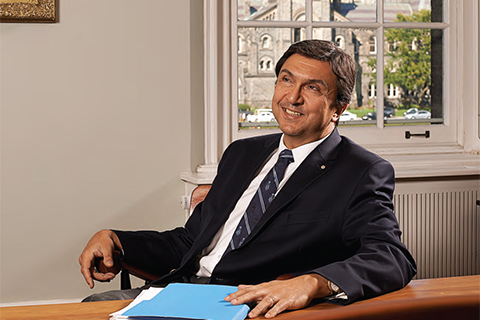Shortly after the Second World War, Leslie Dan arrived in Canada alone, and found work in a lumber camp and as a busboy to save money for university. After 18 months, he enrolled in pharmacy at U of T, became the first Canadian pharmacist to earn an MBA (also from U of T), and went on to found what became one of the world’s largest drug manufacturing companies. The rest – including an historic donation to U of T’s Faculty of Pharmacy – is history.
Although Dr. Dan’s early challenges, outsized success and generosity are unusual, in some respects his story is not. Alumni tell us time and again how important their U of T education was to their subsequent endeavours. And for many, a scholarship or bursary opened doors that might otherwise have been closed.
Devon Ethier, for example, received a National Scholarship covering his tuition for all four years at U of T. Now a fourth year commerce student, Devon says the award, in addition to providing much-needed financial assistance, enabled him to leave his home province of British Columbia, broadening his life experience. The scholarship also led indirectly to a three-week placement earlier this year in a village in Mali, working with Hands Across the Nations, a small Toronto development agency. He is now thinking about how his business education might be applied longer-term in the development arena.
Scholarships and needs-based awards give countless University of Toronto students like Devon the opportunity to receive a first-rate education while at the same time developing important life and leadership skills. That’s why, over the past 20 years, the value of bursaries and scholarships U of T offers annually has grown from $8 million to $143 million. Bursaries and scholarships now account for about 10 per cent of the university’s operating expenses, up from four per cent in 1996.
As per-student provincial grants have dropped in recent years, the university has had to rely more on tuition revenues. To ensure that U of T remains open to the best students, regardless of their economic circumstances, in 1998 the Governing Council affirmed that “no student offered admission to a program at U of T should be unable to enter or complete the program due to lack of financial means.”
I’m proud that U of T made this commitment and has followed through on it. Compared to its Ontario peers, U of T has relatively more students from lower-income households. And more than 2,000 students in the Faculty of Arts and Science who receive OSAP effectively pay zero tuition because of the financial support they receive from the university, while 8,000 students pay $4,000 or less. Our commitment applies to graduate students as well as undergrads. The majority of students in our doctoral-stream programs receive funding packages for up to five years of study. As Canada’s pre-eminent graduate university, we have also created a program of competitive doctoral completion grants for students requiring additional support to finish their programs beyond the usual timeframe. In 2008-09, graduate students received $195 million in funding.
Based on the exceptional growth in student aid over the past two decades, one might think that additional support is not required. That’s simply not the case. Enrolment has soared in that time – by about 40 per cent. More high-achieving students than ever are applying to U of T, and our peers, nationally and internationally, are offering them ever-larger scholarships. Costs of education and living expenses have increased. And in a changing educational context, we need to offer our students a broader and better learning experience. For example, some of our peer institutions send substantially more undergraduates overseas for a term abroad. Supporting students in this way helps to equip them for success in a world that grows ever more interconnected.
Time and again, we have seen accomplished alumni not only mentor their successors at the university, but give back to their alma mater by funding awards for today’s and tomorrow’s students. It’s a virtuous cycle that has had a huge impact on the institution, and is a very wise investment in Canada’s next generation of leaders. For that, among other things, I send my thanks and warmest wishes to the University of Toronto’s remarkable alumni.
Sincerely,
David Naylor
Recent Posts
People Worry That AI Will Replace Workers. But It Could Make Some More Productive
These scholars say artificial intelligence could help reduce income inequality
A Sentinel for Global Health
AI is promising a better – and faster – way to monitor the world for emerging medical threats
The Age of Deception
AI is generating a disinformation arms race. The window to stop it may be closing






One Response to “ Investing in Talent ”
Dear Mr. President, when are international students going to get scholarships? At $24,000 for tuition fees and $15,000 for residence accommodation and other expenses, we pay more than four times what an average Canadian student pays to study at U of T for a year!